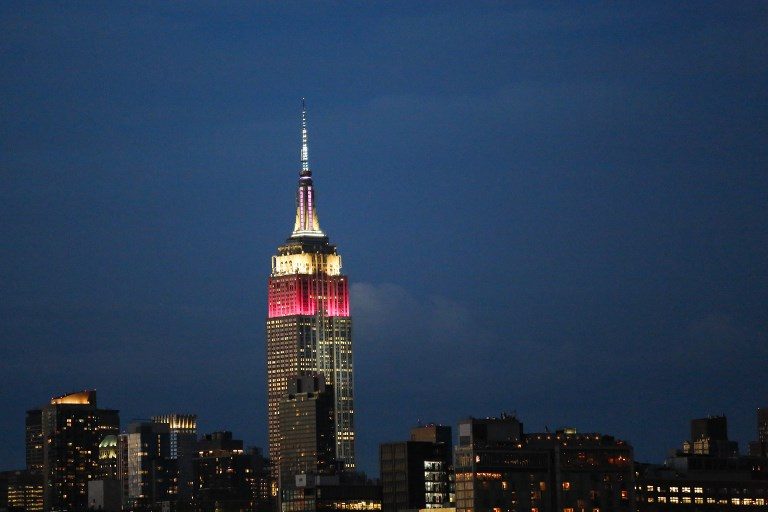SUMMARY
This is AI generated summarization, which may have errors. For context, always refer to the full article.

WASHINGTON DC, USA – US President Donald Trump may accuse Qatar of sponsoring terrorism, but that did not stop the wealthy emirate this week from lighting up the Empire State building in the national colors of the Middle Eastern nation.
Trump – who himself once tried to acquire the Manhattan skyscraper – has sided with Saudi Arabia in its increasingly bitter dispute with Qatar, but Doha has adopted a tactic long used by its more powerful Saudi neighbor to get its own way, buying up substantial shares in the US economy as a bulwark against shifting political sands.
The iconic 102-story Empire State building was bathed in the burgundy and white of Qatar Airways, the state flag carrier of Qatar, ostensibly to celebrate 10 years of flights into the United States.
Less obvious was the fact that almost a year ago, the oil and gas-rich emirate purchased a 10%, $622 million stake in the all-American building.
Trump once tried unsuccessfully to seize control of the building during his heyday as a New York property mogul, when he still owned the land that the skyscraper stands on.
Last month, Qatar stunned American Airlines with plans to acquire a 10% stake in the world’s largest commercial air carrier.
At the same time, it signed a $12 billion contract to buy 36 F-15 fighter jets from Boeing: a fraction of the $110-billion arms deal inked when Mr Trump visited Riyadh in May, but still enough to make US business leaders sit up and listen.
“They have tentacles everywhere, they are amazing,” said Randa Slim, a scholar at the Middle East Institute.
‘A listening ear’
Qatar’s greatest international asset, of course, is hosting the forward headquarters of US Central Command on its soil, putting the country squarely at the heart of the global US military footprint.
Doha is also home to shiny outposts of Georgetown University and the Brookings Institution, among Washington’s most prestigious think tanks, which Qatari officials said should promote the “bright image” of Qatar to the international media, “especially the American ones.”
Like Trump, a property tycoon turned president, Qatari investors have dived into real estate on four continents, bankrolling and buying into major developments in Washington, Chicago and London, where they bought a stake in Heathrow Airport.
Slim said that US concern for Qatar’s Al-Udeid Air Base – which the Americans use to stage operations in Syria, Afghanistan, Iraq and Yemen – guaranteed that Washington would give Qatar’s position in the crisis considerable weight.
While the president Tweeted about alleged Qatari backing for Syrian jihadists, his own Defense Department assured Qatar of continuing US support, while the State Department rebuked the Saudi coalition for its treatment of the country, seen by other Gulf states as too close to Iran.
“Definitely, the White House does not seem to be on their side but you have other powerful agencies that are standing on their side, at least until now,” Slim said.
“Even if you have groups who are arguing for a balanced position in this administration, I don’t see anyone siding with Qatar 100%,” she added.
“Qatar does not have 100% support. Qatar has a listening ear.”
Saudi’s heavyweight checkbook
Whatever inroads Doha may have made, Saudi Arabia, their larger and richer adversary in the crisis, retains a formidable position.
That kingdom is the second-largest foreign supplier of crude oil to the United States, a long-standing linchpin of US foreign policy and a major backer of large US corporations.
As Trump prepared to tour the Middle East in May, Riyadh pledged to pour $20 billion into an infrastructure fund managed by the investment firm Blackstone, whose billionaire chairman Stephen Schwarzman is a prominent Trump backer.
This came on the heels of $110 billion in arms sales as well as billions more in deals for General Electric and Lockheed Martin.
On the campaign trail, Trump also praised Saudi investors for buying his apartments, and he has reportedly incorporated companies in the kingdom.
Meanwhile, the Qataris have few established business links with the Trump clan if any – but not for want of effort by the real estate mogul.
“By virtue of their relative size (both geographic and financial), Qatar will always be weaker,” said Robert Blecher, acting director of the Middle East program at the International Crisis Group.
“But not weak enough to make finances and business deals the decisive factor in this contretemps.”
According to James Jeffrey of the Washington Institute for Near East Policy, under normal circumstances investments would not factor into geopolitical considerations.
“When you have a huge strategic problem such as this, the American position is traditionally, ‘We don’t care who’s bought shares,'” Jeffrey, a long serving US diplomat in the Middle East and a former deputy national security advisor to President George W. Bush, told Agence France-Presse.
But he said this particular White House may be sending the signal that business ties do count for a great deal. “This administration has given plenty of indications that that’s the way it works,” he said. – Rappler.com
Add a comment
How does this make you feel?
There are no comments yet. Add your comment to start the conversation.